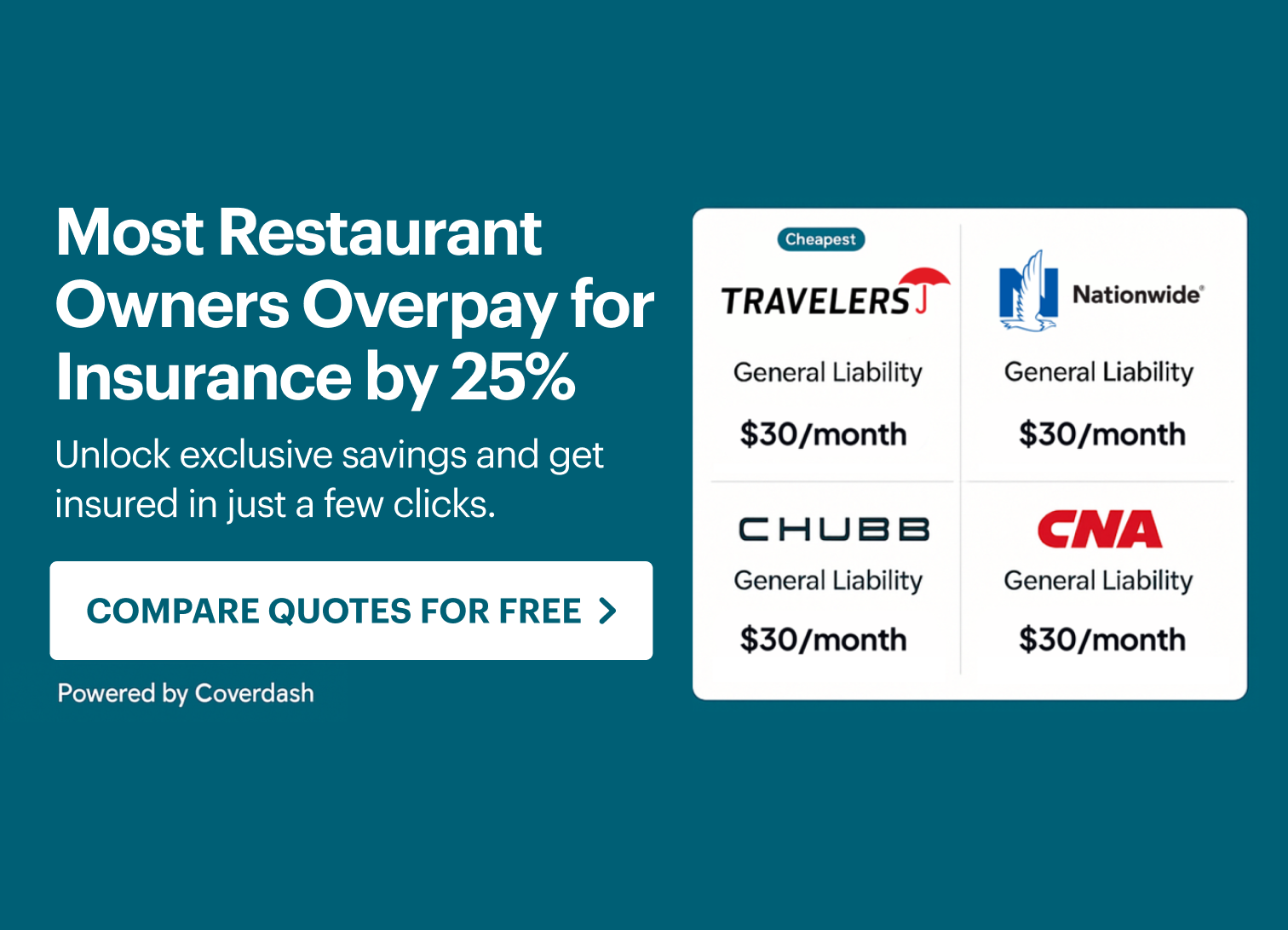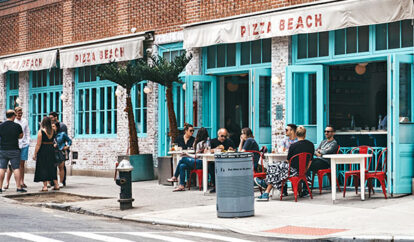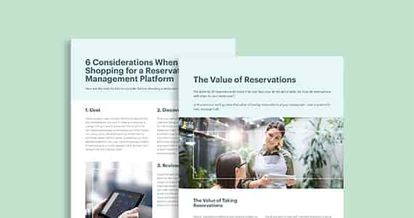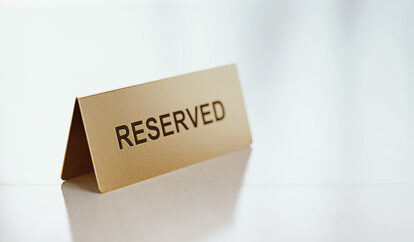As the most populated city in the United States, New York City is a great place to open a restaurant. The city’s numbers have reached a record high of more than 8.6 million people, an increase of more than 5% in the last few years – and everyone needs to eat!
As the population continues to grow, the number of restaurants in NYC keeps growing as well. According to the National Restaurant Association, there were nearly 45,000 eating and drinking establishments, nearly 26,700 open restaurants in the city alone. Though the competition is high among New York City restaurants, there is great potential for success.
Planning is key when it comes to opening a restaurant, so we’ve compiled this comprehensive guide to help you get started and make you successful.
We’ll cover:
- Planning: selecting the right location, getting financed, NYC zoning and bylaws
- Getting Started: insurance, taxes, permits, licenses, health inspection, disability compliance
- Building an Expert Restaurant Team

Planning Your Restaurant
It’s exciting to find and prepare the physical space for your restaurant, and to start the real work that will transform your dream into a reality. As exciting as it is to get into the nitty-gritty details, you still need to take your time and make sure you do everything right.
Here is a quick list of some of the details you’ll need to think about:
- Where your restaurant is going to be located in New York City
- How much you can afford in rent and how to find a restaurant to lease
- Which zoning laws you’ll need to abide by for your restaurant
- Who you should include in your team of NYC restaurant experts
Let’s take a closer look at each of these things.
1. Choosing a Location for Your NYC Restaurant
Choosing the right location for your restaurant is extremely important. Not only will it affect how much you’ll be paying in rent, but it also affects your target audience, your competition, and the spaces you’ll have available to choose from.
Before you actually start looking for a restaurant to lease, take some time to explore different areas of the city to see what you think could be a good fit. To get into the nitty-gritty details of performing a location analysis for each area you are considering, try this useful worksheet.
Not sure where to start your search for the perfect location?
Here are some of the best options for a new restaurant in New York City:
- Soho – Located south of Houston Street, this fashionable neighborhood is home to an assortment of hot new restaurants, spas, and boutiques with quaint cobblestoned streets and plenty of charm.
- Chelsea – Known for its nightlife and the hub of NYC’s LGBT scene, this section of West Manhattan is home to the city’s socialites and trendsetters. Convenient to Midtown and the West Village, this trendy neighborhood is pricey but well worth the cost if you can make it work.
- East Village – Once the heart of NYC’s hippie scene, the East Village has been taken over by NYU students and faculty, but still remains one of the best neighborhoods for dining, nightlife, and culture.
- Lower East Side – Home to countless historic spots, the Lower East Side is a center for alternative and creative nightlife where dive bars share the sidewalk with A-list hotspots.
- Hell’s Kitchen – On the rise from its seedy past, Hell’s Kitchen is home to a cornucopia of bars and restaurants ranging from super high-end spots to old-school Italian bistros. It may not be the center of tourism it once was, but it’s conveniently located near subways and the theaters of Times Square.
- Upper East Side – Walking distance to some of the city’s best museums, the Upper East Side is home to doctors, lawyers, and old family money but still has an unexpected homey vibe with easy access to Central Park.
2. How to Lease a Restaurant
Property is at a premium in New York City, so unless you’re independently wealthy, you’re probably going to lease your restaurant space. Start the search for the perfect property as early as possible because the process can take much longer than you might expect.
When looking for properties to lease for your restaurant, there are many factors to consider. First and foremost, think about the practical – how much you can afford to pay in rent. Unfortunately, you can’t predict exactly how much revenue your restaurant will have, so the best way to determine how much you can afford is to pay no more than 6% to 10% of your gross sales as the total occupancy cost. This will include rent as well as your property taxes, insurance, and other operational costs.
Think about your restaurant concept and find a property that fits. Even if you have a specific concept in mind, be prepared to make adjustments based on factors such as your target audience, menu pricing, and your projected annual sales. If these things don’t all line up, you might need to reconsider your options.
Only after you’ve determined how much you can afford to pay in rent, and what kind of location will fit your concept, can you start to actually look at properties. Find properties that fit your criteria by working with a real estate broker, searching for restaurants for lease online, and by driving around your ideal area looking for “For Lease” signs.
A New York restaurant real estate broker is a key addition to your expert restaurant team. We’ll go into more detail about hiring an NYC commercial real estate broker later, but if you want more information about leasing a restaurant space, click here.
3. New York City Bylaws, Zoning, & Planning
Choosing the perfect location for your New York City restaurant also involves thinking about city bylaws and zoning that can affect your business. The viability of your restaurant depends on knowing these regulations and making sure you meet the requirements.
What are these regulations and why do they exist?
New York City zoning laws dictate what areas of the city can be used for what purpose. The goal is to make sure that businesses don’t have a negative impact on residents in the area.
In some cases, these regulations aren’t set in stone. For example, if you can make a case for how your restaurant will economically advance the community, you might be able to obtain a zoning permit to modify or suspend bylaws prohibiting your business. You’ll need to talk to your alderman or councilor about the specific zoning laws in the area where you want to put your restaurant.
Here is a quick set of steps you’ll need to follow when it comes to zoning laws and permits:
- Based on where your restaurant is located, determine whether you’ll be subject to municipal or county zoning laws.
- Inquire with the municipal or county clerk’s office to identify the zoning code in your area (it may be commercial, residential, or mixed-use).
- Acquire any necessary zoning permits and make sure you adhere to all regulations.
For more detailed information about zoning bylaws and permits in New York City, contact your municipal or county clerk’s office and check this list of zoning districts for NYC.
Getting Started
In this section, we cover all of the resources you’ll need to get started.
You will learn:
- What type of insurance you’ll need to open and run a restaurant in NYC
- How much you’ll be paying for taxes, registration, permits, and licenses
- What to expect from your NYC restaurant health inspection
- How to ensure that your restaurant is compliant with the American Disabilities Act
- Which locations in NYC are the best for opening a new restaurant
- How to navigate the logistics of bylaws, zoning, and city planning
- Who to include in your NYC expert restaurant team
Let’s start by taking a look at the different types of insurance you’ll need when opening and running a restaurant in New York City.
1. What Kind of Insurance Does a NYC Restaurant Need?
With a complex business such as a restaurant, there is a lot of potential for things to go wrong, so put a safety net in place by making sure you have all of the right insurance policies. It can save you from loss of income, property damage, and injury lawsuits.
Here are different types of insurance you might need as a restaurateur in NYC:
- Commercial property insurance
- General liability insurance
- Liquor liability insurance
- Liquor bond (state mandated)
- Food contamination insurance
- Products liability exposure insurance
- Employee dishonesty insurance
A NYC restaurant insurance broker, part of your expert restaurant team, will ensure you get the right insurance plans for your business in your location.
Let’s take a more detailed look at the different types of insurance you’ll need to consider:
- Commercial Property Insurance – This insurance protects the property itself against things like fire or other events that cause damage to the property.
- General Liability Insurance – This type of insurance protects your business against property damage, personal injury, copyright infringement, damaged reputation, and food-borne illness.
- Liquor Liability Insurance – This insurance protects you in case an intoxicated patron damages your property, injures someone, or commits a crime.
- Liquor Bond – This is required to apply for and keep a liquor license, and it is mandated by New York State Liquor Authority.
- Food Contamination Insurance – This protects you from the loss of having to replace spoiled food due to power or equipment failure.
- Products Liability Exposure Insurance – This insurance protects you against damages caused by allergic reactions or food poisoning.
- Employee Dishonesty Insurance – This policy protects you against employee theft, typically in the form of cash, food, equipment, or supplies.
In addition to these insurance policies, you might consider the following as well:
- Commercial crime insurance
- Employment practices liability insurance
- Business owner’s policy
- Business interruption or loss of business insurance
- Workers compensation insurance
- Auto insurance (for business vehicles)
You will be able to customize your insurance coverage to suit your unique needs. For example, if you don’t plan to serve alcohol at your restaurant, you won’t need liquor liability insurance. Your NYC insurance broker will help you determine your needs and pick the best policy to cover them.
To learn more about each of these and other types of insurance for a NYC restaurant, click here.
2. Understanding NYC Taxes
Paying taxes is a fact of life and, as a restauranteur, you’ll be paying a lot of them. Hedge against any unpleasant surprises (and money owed!) by familiarizing yourself with mandatory NYC restaurant taxes.
Here are some of the different types of taxes you’ll be paying as an NYC restaurateur:
- Income tax
- Payroll tax
- Sales tax
- Taxes on tips
If just thinking about taxes is enough to make you sweat, do yourself a favor and hire a New York City restaurant accountant to handle them for you. We’ll talk more about what a restaurant accountant does and how to hire one later. For now, let’s take a closer look at the taxes NYC restaurateurs pay.
- Income Tax – You will report your income based on the type of business you file as. If you are a sole proprietor, your income will be taxed as part of your personal tax return. You’ll need to file a business tax return if you file as a Corporation or LLC.
- Payroll Tax – There are two types of payroll tax – deductions taken out of employee wages, and taxes you pay as the employer. You’ll be responsible for paying for half of 12.4% for social security and 2.9% for Medicare. The other half comes out of your staff’s pay. You also pay 6% for federal unemployment.
- Sales Tax – This is a tax imposed by the government on the sale of goods and services, so you’ll be charging sales tax on every bill and paying it to the government. For food and beverages sold in New York City, you’ll pay the following sale tax rates for a total of 8.875%:
- City Sales Tax – 4.5%
- New York State Sales and Use Tax – 4%
- Metropolitan Commuter Transportation District Surcharge – 0.375%
- Taxes on Tips – Technically, this is a tax that your employees will be paying, but it’s still a good idea to know what they are. Tips are considered taxable income if an employee makes more than $30/month in tips, in which case they must claim all of the tips they make. Mandatory gratuity automatically added to the bill is not taxable as long as the charge is shown separately on the bill, it is specifically identified as gratuity, and the money collected is given to the employee.
In addition to these taxes, there are other items in a restaurant which may be taxable. Here is a brief list of miscellaneous taxable items:
- Mandatory gratuity
- Corkage fees
- Cover charges
- Delivery charges
- Coupons
Gift certificates and gift cards are not subject to sales tax. When the customer uses the card, however, sales tax is charged on applicable purchases. Employee are not subject to sale tax either, as long as you don’t collect payment and the value of the meal isn’t considered income under federal or state law.
To learn more about the different types of taxes you’ll be paying as a NYC restaurateur, refer to this article, Understanding Restaurant Taxes.
3. NYC Restaurant Registration, Permits, and Licenses
Prior to opening day, one of your biggest concerns is to get the proper permits and licenses. These can take time to obtain, so start early and be prepared to wade through some red tape.
To determine what kind of permits and licenses you’ll need for a NYC restaurant, here are some of the factors that come into play:
- The size and legal structure of your restaurant
- The actual space you plan to purchase or lease
- The activity that will take place in your business
- Any required equipment or emissions
- The inventory you sell outside your business
- The square footage of your indoor and outdoor space
- Renovations or modifications to the building
- Staff insurance and training requirements
- Waste disposal and company vehicle operations
- Entertainment options and promotional events
At a minimum, you’re going to need to obtain these permits:
New York City Business License
On Pemises Liquor License (if you intend to serve alcohol)
Other permits you may require include things like sign permits, food handler’s permits, and music licenses.
Here is a list of some of the most important licenses and permits you may need depending on your restaurant type:
- Food Service Establishment Permit
- Temporary Food Service Establishment
- Mobile Food Vendor Permit
- Non-Retail Food Processing Establishment Permit
- Permit to Manufacture Frozen Desserts
- Shared Kitchen Permit
- Food Protection Certificate for Food Service Establishment
- Restricted Area Mobile Food Vending Permit
- Sidewalk Café License
To determine exactly which permits and licenses you may need for your NYC restaurant, use this simple online tool.
More information about restaurant permits and licenses can be found here.
In addition to obtaining the permits and licenses listed above, you’ll also need to register your restaurant, and register as a Sales Tax Vendor.
To register your restaurant in New York State, you’ll be required to file a Business Certificate, also known as a Certificate of Assumed Name. You can obtain the proper form online and file it in the office of the County Clerk in the county in which your business is located. You’ll also need to obtain a Sales Tax/Registered Vendor/Resale number in order to charge sales tax. You must register with the Tax Department and obtain a Certificate of Authority which you can find here and submit it to the New York State Tax Department.
For more detailed information about registering your restaurant and obtaining a Sales Tax Vendor number, click here.
Outside of permits and licenses, there are other requirements you will need to meet for your New York City Restaurant. For example, you’ll need to post the following signs:
- Alcohol Pregnancy Warning Sign
- Food Allergy Poster
- Choking First Aid Poster
- Letter Grade Poster
- Wheelchair Friendly Decal
- Must Wash Hands Sign
Some of the other signs you may be required to post include a certificate of occupancy, sales tax certificate of authority, place of assembly certificate of operation and permit, fair labor standards act, tips and taxation, and more. For a detailed list of required signs for NYC restaurants and bars, click here.
4. Tips for NYC Health Inspections
Obtaining the required permits and licenses is important but none of it will matter if your business can’t pass inspection.
Every food service establishment in NYC will receive an on-site inspection at least once a year.
For the inspection, a NYC health inspector will come to your restaurant unannounced to review your business for quality and safety. They can arrive any time the business is preparing food or drink, or after it opens to the public.
You can expect the health inspector to check for the following things:
- Safe food storage procedures and temperatures
- Compliance with basic food handling laws
- Employees meeting personal hygiene standards
- Proper pest control measures and adequate sanitation
Throughout the inspection, the health inspector will keep a record of observed violations of the Health Code and assign a point value. At the end of the inspection, the inspector totals the points to grade your restaurant – the lower the number, the better the compliance with the Health Code. The inspector will review the results with you and explain any violations. Failure to correct these violations results in fines or shutting down your restaurant.
Some of the most serious Health Code violations include food not cooked to the required minimum temperature, raw food not properly washed, evidence of mice on the premises. To learn more about food safety standards and how to ensure that your restaurant is up to code, review the NYC guide.
5. American Disabilities Act (ADA) Compliance
All restaurants in the U.S. must comply with the Federal Americans with Disabilities Act (ADA). It is your job as a business owner to ensure that your business is accessible through reasonable means by disabled persons. The ADA outlines specific accommodations you are required to make, including the following:
- Removing Architectural Barriers – Physical features such as narrow aisles, fixed seating, and difficult door hardware pose an architectural barrier that may limit or prevent disabled persons from accessing or obtaining goods from your restaurant.
- Providing Accessible Parking – If your restaurant offers private parking, you must provide designated handicap accessible parking as well as additional space to at least one side which serves as an access aisle for people in wheelchairs.
- Creating Accessible Entrances – An adequate opening, ramp or lift, must make your business accessible by disabled persons from the sidewalk, parking area, or from public transportation.
- Providing Maneuvering Space – You must provide indoor space for maneuverability by wheelchairs.
For more information about making your New York City restaurant ADA compliant, call 1-800-514-0301. Review this page to learn about tax credits and deductions to help you pay for ADA-required modifications to your business.
Building a NYC Expert Restaurant Team
Conceptualizing a restaurant and turning it into a reality is a big undertaking and not one you should attempt to do alone. Having a team of experts in your corner will help you navigate the planning process as quickly and painlessly as possible.
Here are some of the people you’ll want to include in your NYC restaurant team:
- Restaurant Consultants
- Restaurant Insurance Broker
- Restaurant Real Estate Broker
- Restaurant Accountant
- Restaurant Attorney
- Restaurant Construction and Remodeling
Let’s take a closer look at the role each of these experts plays, and list some of the best in NYC.
1. Restaurant Consultant
Perhaps one of the most important people on your expert restaurant team is the restaurant consultant. This expert helps with everything from developing a business plan and creating your menu to selecting your restaurant location and training your staff.
Here are some of the top restaurant consultants in New York City:
2. Restaurant Insurance Broker
Having the right insurance policies will protect your restaurant and you, as the business owner. A restaurant insurance broker will help you determine the specific needs of your business, choose the right policies, and be there to assist you in the event of a claim.
Here are some of the top restaurant insurance brokers in New York City:
3. Restaurant Real Estate Broker
Also known as a commercial real estate agent, a restaurant real estate agent will help you find the ideal property for your restaurant and will help you negotiate the lease. A broker will provide you with access to private listings you might not otherwise see. In most cases, a broker charges a percentage of the total sale or lease price on contingency.
Here are some of the top restaurant real estate brokers in New York City:
4. Restaurant Accountant
Hiring a restaurant accountant from the start of your business will help you stay organized and compliant with general bookkeeping, creating a budget, managing finances, performing financial analysis, and managing payroll. Here are some of the top restaurant accountants in New York City:
5. Restaurant Attorney
Starting a business requires a lot of paperwork – especially in the restaurant business. A restaurant attorney provides legal guidance wherever you need it. This may include drawing up contracts, registering your business, submitting trademark applications, and ensuring labor law compliance.
Here are some of the top restaurant attorneys in New York City:
6. Restaurant Construction and Remodeling
Once you’ve leased a restaurant, it will take some work to make it truly your own. Hiring a restaurant construction and remodeling team is key to taking your restaurant from dream to reality. It will also ensure that your business is up to code for both safety and compliance.
Here are some of the top restaurant construction and remodeling companies in New York City:
Learn more about building your team of New York City restaurant experts and get costs here.
Sign up for our free weekly TouchBistro Newsletter





